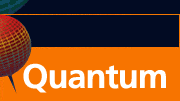CONTACTS
 |


Quantum Initiative: Quantum Lunch
The Quantum Lunch is regularly held on Thursdays in the Theoretical Division Conference Room, TA-3, Building 123, Room 121.
The organizing committee includes Malcolm Boshier (P-21), Lukasz Cincio (T-4), Diego Dalvit (T-4), Michael Di Rosa (C-PCS), Changhyun Ryu (P-21) , Nikolai Sinitsyn (T-4), Rolando Somma (T-4), Yigit Subasi (T-4), Christopher Ticknor (T-1), and Wojciech Zurek (T-4).
For more information, or to nominate a speaker, contact Yigit Subasi.
To add your name to the Quantum Lunch email list, contact Kacy Hopwood.
Thursday February 9, 2017
12:30 PM - 2:00 PM
Speaker: Peter McMahon (Stanford University)
Technical Host: Marcus Daniels
TOPIC: Computing using networks of optical parametric oscillators
Abstract
Combinatorial optimization problems, including many nondeterministic polynomial-time–hard (NP-hard) problems, are central in numerous important application areas, including operations and scheduling, drug discovery, finance, circuit design, sensing, and manufacturing. Despite large advances in both algorithms and digital computer technology, even typical instances of NP-hard problems that arise in practice may be very difficult to solve on conventional computers. There is a long history of attempts to find alternatives to current von Neumann–computer–based methods for solving such problems, including use of neural networks realized with analog electronic circuits and by using molecular computing. A major topic of contemporary interest is the study of adiabatic quantum computation (AQC) and quantum annealing (QA). Sophisticated AQC/QA devices are already under study, but providing dense connectivity between qubits remains a major challenge, with important implications for the efficiency of AQC/QA systems.
Networks of coupled optical parametric oscillators (OPOs) are an alternative physical system, with an unconventional operating mechanism, for solving the Ising problem and by extension many other combinatorial optimization problems. We have realized a fully-programmable 100-spin Ising machine using a network of OPOs, and with it can solve many different Ising problems. In cases in which exact solutions are not easy to obtain, we can find good approximate solutions. Our design supports all-to-all connectivity among the implemented spins via a combination of time-division multiplexing and measurement feedback.
In this talk I will describe our work on constructing Ising machines using OPO networks with feedback, and will present the experimental results from our first prototype system.
|


